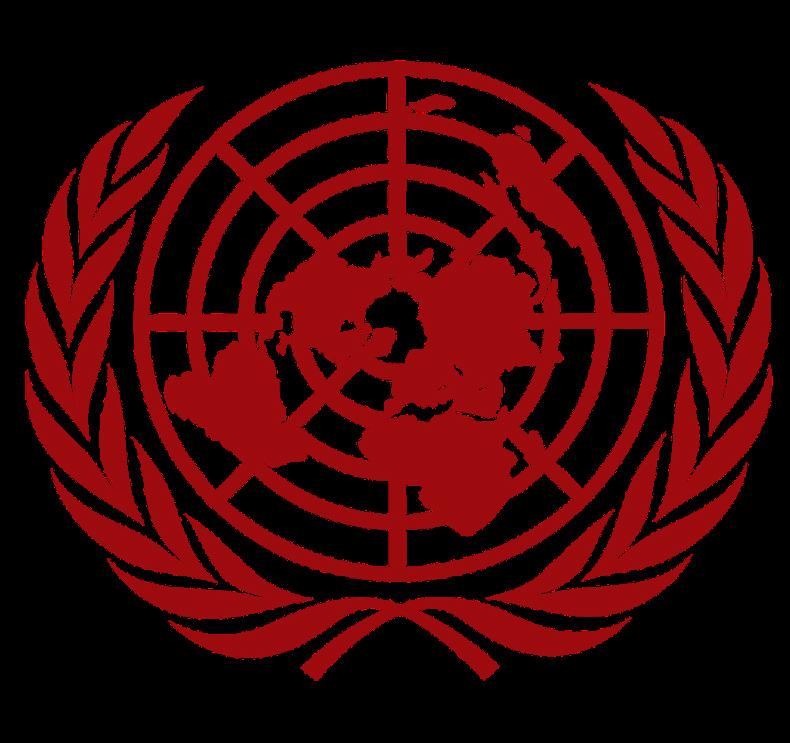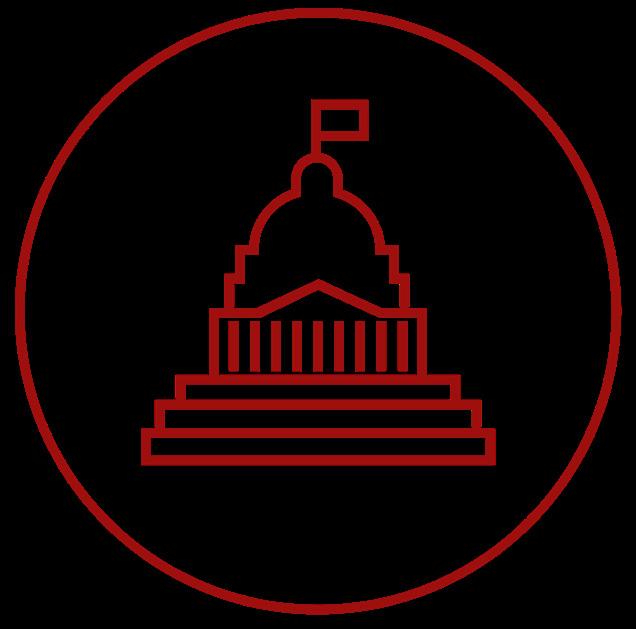
7 minute read
Policy & Governance
pg. 28
Decolonizing Policy & Governance
Advertisement
JACQUELYN COVEY
All but five countries in the world were completely or partially colonized by European settler-empires. The colonization of these countries extends beyond the initial act of seizing Indigenous lands to our present day. The legacy of colonization is the de jure enforcement of European systems of religion, education, government, and ways of being. Native American political activist, John Trudell, said “If colonialism made the modern world, decolonization cannot be complete until the world —including Europe— is remade.” To decolonize our world is to dismantle the political, economic, and cultural status quo that colonial ideologies are superior to Indigenous approaches, and in its place, remake and revitalize our society with Indigenous knowledge.
The settler-empires of Europe and, by extension, the United States, are governments whose governance is colonial in nature. Viewed through the lens of Policy and Governance, the process of decolonization begins with the dignifying and valuing of Indigenous ways of being, laws, and governments - not only as totally legitimate, but as excellent models of governance.
Colonial Background
The view that the earth is an endless resource of raw materials that can be exploited for gain is a settler-colonial ideology that must be deconstructed. In their world-view, the non-European Native peoples they encountered were less than human and were wasting the land. Native Americans were spiritually and physically connected to the land. Symbiosis with the natural world was central to their way of life. They honored their place in nature and understood the earth to be their Mother, giver of all life. Every animal and force in nature had a spirit and an important role to play in the
pg. 29 Policy & Governance
ecosystem. From the Indigenous worldview, the concept of owning land, let alone pillaging and destroying it for riches, was unfathomable.
In the 1700s, European settlers extracted all they could: fish, whale, meat, furs, oil, gold, and minerals. Indigenous nations reigned with sovereignty in the lands between the growing number of European settlements, but the foundations of colonization were laid. Settlers turned to colonizers, and by the 1800s, they had organized in number, law, and political might to subjugate and gain control of Native peoples and their lands. Ultimately, the colonization process resulted in Indigenous peoples’ severance from their traditional ways of life, intergenerational trauma, and an unwanted dependence on the settler-colonizer nation of the United States.
The U.S. government has a violent history of acting upon Native peoples. The federal government dissolved tribal governments when it saw fit and reengineered those same governments when facilitating extractive industry better suited their interests. The American tradition of abuse of Native Peoples and the land will continue so long as the colonial mindset created by the settler-empire remains intact.
All people will benefit from the decolonization of our current political ideologies. If we replace ideology that allows for the devastation of our planet with Indigenous wisdom that we are all connected to each other and the land, we will discover that wealth is found in that interconnectedness. Decolonization, followed by indigenization, contributes to a world where shared understanding opens opportunities for relationships between Indigenous and non-Indigenous people. This type of ethic confronts the dominance of settler colonization within history and governance.
The United States government champions competition, individualism, and “success.” Conversely, the governance of Indigenous peoples is traditionally oriented around the values of happiness, sharing, group well-being, and respect for the environment. Native American governments have strong similarities one to another, but Native Peoples are not a monolith. They make up the most culturally diverse group in the United States. The structure of society, family life, religion, language, attire, architecture, and cultural practices greatly differ between tribes. Though distinct, tribes across the continent share a history in developing economic and government systems with well-defined roles and
Policy & Governance pg. 30
responsibilities. They govern in ways that promote group involvement and consensus in decision-making, ultimately fostering harmonious relations with tribes, land, and a cosmological understanding of the universe.
Examples of Decolonization
An important lesson can be learned from the hollow decolonization efforts of the French government. President Emmanuel Macron created a commission to return objects in French museums that were stolen from sub-Saharan Africa. The commission decided that of the 90,000 items identified, France would return 26, or 0.02%. To date, only one item has actually been returned. Decolonizing museums in France has proved to be an insincere endeavour to return Indigenous treasures to Indigenous peoples.
Accountability is essential in order to ensure that decolonization efforts do not become mere platitudes and fall short of indigenization and reconciliation. The work of decolonization must be articulated by Native Peoples, then non-Indigenous people and settler governments alike must commit to real, measurable steps in carrying out that work.
pg. 31 Policy & Governance

Policy & Governance pg. 32
An encouraging example in governmental decolonization is the Truth and Reconciliation Commission of Canada (TRCC), which spanned from 2008-2015. At the center of the commission’s work were 94 calls-to-action demanded by First Nations people. These action-items oriented around the government’s obligation to reconcile the systemic intergenerational oppression experienced by First Nations peoples. Other items included retelling history in truth, justice for missing and murdered Indigenous women, Indigenous-informed education, dignifying the lived-experiences of First Nations communities and improving their outcomes. There has been some debate as to whether the Canadian government has followed through on its commitments to implement these action-items. This criticism is due, in part, to the continued over-policing of Indigenous peoples and inequity in the legal system. Some healing and progress was enjoyed by First Nations people during the seven years the TRCC was active, but it is unfortunate that the Canadian government ultimately disbanded the commission. This decision points to the unreasonable belief that seven years of decolonization efforts is sufficient to account for centuries of colonial oppression. The implementation of the 94 calls-to-action is still considered the optimal path forward in Canadian decolonization.
The United Nations is a global governing body leading efforts in decolonization worldwide. The UN assists non-self-governing territories in developing free political institutions according to their own standards. The Decolonization
Unit in the Political and Peace Building
Affairs department holds seminars on decolonization in the Pacific and Carribean, recommends new resolutions for settler-governments to adopt, and visits non-self-governing territories on a yearly basis to monitor conditions on the ground. At the time of the UN’s founding in

pg. 33 Policy & Governance
1946 there were 72 non-self-governing territories and 750 million people —nearly one third of the world’s population— living in territories that were dependent on colonial powers. By 2020, these figures shrunk to 17 non-self-governing territories and 2 million people living in non-selfgoverning territories.
Beyond the UN’s commitment to ensure peoples’ just treatment and protection from abuses, they work to ensure the “political, economic, social, and educational advancement” of these territories according to the peoples’ aspirations. Walter Mignolo, an Argentine academic, supports this model of operating. “Self-determination,” he says, “is a means to delink from settler-colonial ideas of power. It is community-driven and modeled after ancestral ways of governance and being.”
Conclusion
Decolonization work should not be left to Indigenous people alone. On an individual level, non-Indigenous people can acknowledge to whom the unceded land they reside on belonged. Individuals can commit to recognize the contributions of Indigenous people, elevate their voices in public discourse, and never allow or perpetuate stereotypes that disparage Native Peoples and their ways of life. Indigenous and non-Indigenous people alike can hold the United States government accountable to the United Nations’ Declaration on the Rights of Indigenous Peoples. We can unite in the fight against voter disenfranchisement of Native Americans and insist that Indigenous knowledge and history be taught in school curriculums. Finally, we must demand that the United States government free its colonies and give those peoples the democratic rights they deserve.
For some, their decolonization work is from inside the colonial political system, materializing as incremental victories for Indigenous Peoples. For others, decolonization will be rooted in the revitalization of their community and reconnection to ancestral ways of being. In any case, decolonization isn’t a seven-year project. The road to indigenization is long. Centuries of colonization formed the modern American political structure. In accordance, the work of detangling ourselves from colonial mindsets must span generations.
Policy & Governance pg. 34









